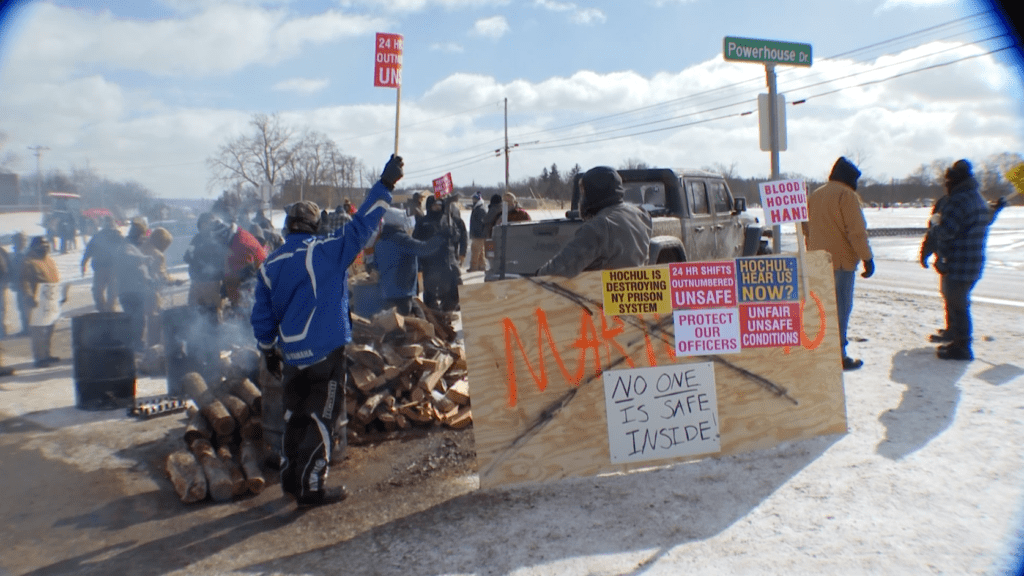Tentative agreement reached between union and state leaders, aiming to end prison staff strikes
NEW YORK STATE – Nearly two weeks after corrections officers began striking at multiple prisons across New York State, leaders of the state and the union representing staff have reached a tentative agreement, aiming to end the strikes.
Gov. Kathy Hochul’s office announced the agreement on Thursday night. It came after the fourth straight day of a third-party mediator helping with the negotiations. The union, the NYS Correctional Officers and Police Benevolent Association, did not authorize the strikes which entered their 11th day on Thursday. The state’s Department of Corrections and Community Supervision has called the strikes illegal.
As of February 28th, guards were still seen on the picket lines at Groveland Correctional Facility in Livingston County. Families spoke with News10NBC’s Kristi Blake saying, they are not happy with the agreement and plan to ‘hold the line.’ “We are not folding. We are holding the line. My husband is not going back to work until this is taken care of indefinitely. This is too important for our family.”
As its peak, there were about 100 guards and families at Groveland. The crowd dwindled as the day went on.
Here’s what to know about the agreement and the path moving forward in state prisons:
What’s next?
Under the agreement, all employees must be back to work by Saturday for their scheduled shifts or they could risk being fired, paying fines, or possibly being arrested for violating a court order.
The NYSCOPBA union says they’ve presented the agreement to striking workers and are encouraging them to return to work. Here is the statement from the union:
“After three days of mediation, NYSCOPBA and the State reached an agreement and Consent Award, which contents were presented to the members who were continuing to refuse to work. …The decisions to return to work is not a collective vote by members of NYSCOPBA. It will be up to each individual who currently is refusing to work to decide whether to return to work or risk termination, potential fines and possible arrest for violating the court order. NYSCOPBA has encouraged each member to return to work based on what was achieved in the Consent Award.”
Details on the agreement
Prison staff have demanded higher staffing levels, no mandated overtime over 16 hours, and increased measures to keep them safe. News10NBC spoke with prison staff and their families at Groveland Correctional Facility in Livingston County during the strikes’ first week about their demands.

Under the new agreement, mandatory 24-hour overtime shifts are gone, replaced by voluntary overtime. The HALT Act, which limits the use of solitary confinement, is also on pause at the request of staff.
The HALT Act limited solitary confinement to 15 straight days and banned solitary for pregnant people, those with disabilities, and anyone older than 55 or younger than 21. Staff say there’s been a rise in assaults on prison employees since it was implemented in 2022.
A wife of a striking guard criticized the agreement, stating, “The proposal given out last night doesn’t fix anything the guards require to go back. It does not halt the solitary itself.”
An independent staffing specialist will be brought on to crunch the numbers on what staffing minimums are needed to prevent mandatory overtime.
On the safety front, another measure taken is security around mail. Corrections officers had a lot of safety concerns, like contraband in prisons, and this is a crackdown on that. The seven-page agreement is binding. You can see the full agreement and a statement from the mediator here:
What will happen with the National Guard?
While corrections officers were on strike, the state brought in thousands of National Guard members to help with prison operations.
Now that there’s an agreement, the National Guard is expected to be slowly replaced by the corrections officers through Saturday. However, some National Guard members will still come in to help meet those staffing minimums and prevent mandatory overtime. It’s ultimately the governor’s call how much the National Guard stays on in the long term.
When can people visit their loved ones in prison again?
During the strikes, many prisons suspended visitations but still allowed inmates to contact their loved ones by phone. News10NBC spoke with a local mother whose son is incarcerated at Orleans Correctional Facility in Albion about her concerns for his well-being during the strikes. We’re working to learn when visitations will resume in prisons.
What’s the reaction from state leaders?
Gov. Kathy Hochul released a statement after the parties reached the agreement, saying she’s grateful to the National Guard and all others who stepped up to maintain order during the strikes. Here is the full statement:
“My top priority is the safety of all New Yorkers, and for the past 11 days, I have deployed every possible State resource to protect the well-being of correction officers, the incarcerated population and local communities across New York. Working with a mediator, we have reached a consent award to address many of the concerns raised by correction officers, put DOCCS back on the path to safe operations, respect the rights of incarcerated individuals and prevent future unsanctioned work stoppages. I have the utmost respect and gratitude for the correction officers, civilian DOCCS employees, National Guard personnel and other staff who have done their absolute best to maintain order in our correctional facilities during this challenging period.”
A.I. assisted with the formatting of this story. Click here to see how WHEC News 10 uses A.I.